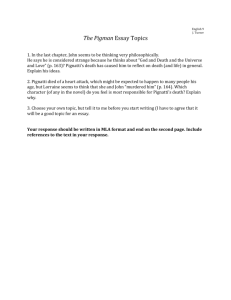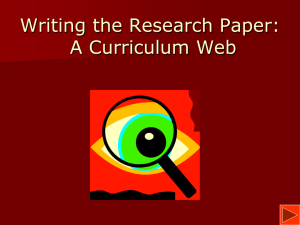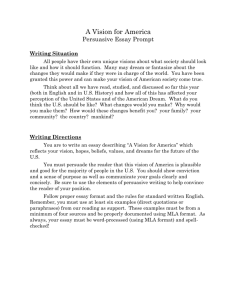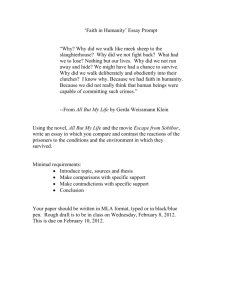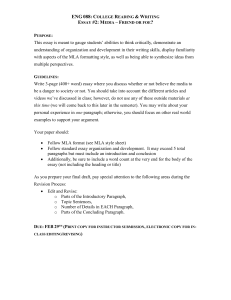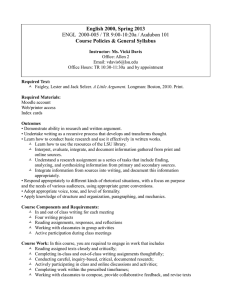Primary and Secondary Sources
advertisement
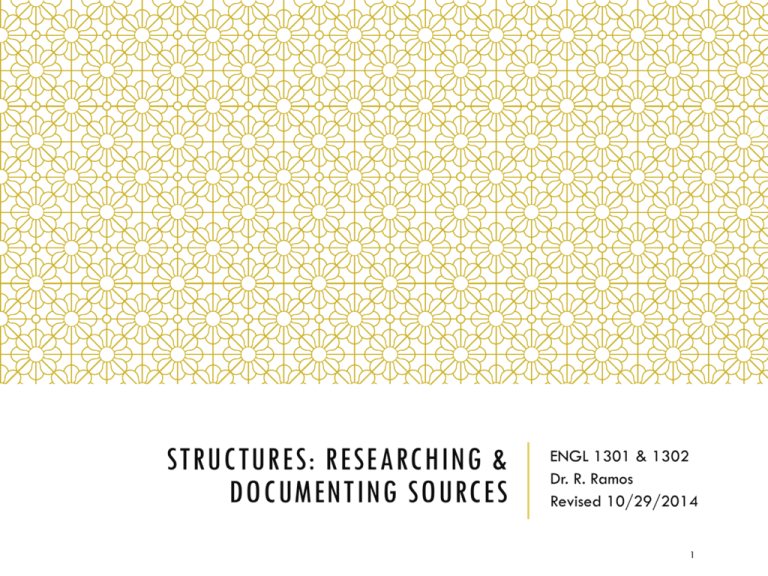
STRUCTURES: RESEARCHING & DOCUMENTING SOURCES ENGL 1301 & 1302 Dr. R. Ramos Revised 10/29/2014 1 OVERVIEW A source is always people other than yourself, so always look first for an actual person’s name or people’s names whenever seeking and identifying sources. The products in which sources give their information – web sites, books, newspaper articles, and so forth – have different names like “references” (in APA Style) or “works” (in MLA Style). However, the word “sources” often refer to both the people and their information products. You need outside sources when 1) the assignment require research or 2) you need more info than what you have in you in order to meet the word length? Looking for outside sources of information – that is, research – belongs in the Invention & Prewriting and Arrangement stages of the Writing Process. Do your research first; then draft your essay (or sections of your essay). 2 TWO KINDS OF SOURCES: PRIMARY AND SECONDARY SOURCES 3 PRIMARY SOURCES A Creator makes his/her personal expression. That expression is a Primary Source Examples: Autobiography Fictional movie Fictional story Interview Painting/Sculpture/ Dance Personal essay Poem Song / Music 4 SECONDARY SOURCES A Critic reviews and/or critiques a Creator’s primary source. That review or critique is a Secondary Source. Examples: Art critic’s review Biographer’s book Documentary Scholar’s analysis Music critic’s review Newscast Research essay 5 HOW THE TWO KINDS ARE RELATED The Creator does not need the Critic to make his/her primary source. But the Critic ALWAYS needs the Creator in order to make his/her secondary source. There will always be more Critics than Creators. If you have a primary source, it’s a good idea (unless your instructor tells you not to) to look for a few secondary sources of that primary source as well. This is useful in an Argument essay, especially if the two secondary sources disagree with each other. 6 SOME REPUTABLE PLACES FOR COLLEGELEVEL SOURCES non-reference books from a public or college library personal interviews from experts, witnesses, and/ or participants news and scholarly articles from library online databases, information from reputable websites 7 WHAT’S A REPUTABLE WEBSITE? Any website whose main purpose ISN’T selling something = usually reputable. If it has a shopping cart (as lots of .com sites do), then don’t use that site. A website with these at the end of the web address are considered reputable – that is, college-level: .com that are respected news sites .edu (education sites) .gov (government sites) .mil (military/ armed forces sites) .org that are respected non-profit organization sites, with one exception: Wikipedia as a source – while useful for casual, everyday use -- is a no-no in college-level research. TIP: When using a web search engine like Google or Bing, type your keyword + a site filter to screen out un-reputable websites -- for example, “depression” site:.edu will give you results only from .edu websites. 8 DOCUMENTING YOUR SOURCES IN MLA STYLE: A TWO-PART PROCESS PART 1: IN-TEXT CITATION Here’s how to do in-text (that is, “in your essay”) citation of your direct quote, short paraphrase, or short summary of your source. Use introductory phrases and/or parentheses to name your source (usually the author’s last name, title – if no last name is available -- and/or applicable page number if the source is a print source). For example: According to Lester Faigley and Jack Selzer, “A reason is often offered in a because clause” (24). “A reason is often offered in a because clause” (Faigley and Selzer 24). 9 DOCUMENTING YOUR SOURCES IN MLA STYLE: A TWO-PART PROCESS PART 2: WORKS CITED LIST Here’s how to do the end-of-text (that is, at the end of your essay) Works Cited source list. Use an alphabetical-by-last-name list of the sources that you used in your essay, also called the “Works Cited” list. If you label this list “References” (APA Style) or “Bibliography” (CMS Style), then you are NOT doing MLA Style. An example of the order of information for a book source: Works Cited Faigley, Lester and Jack Selzer. Good Reasons: Researching and Writing Effective Arguments .5th ed. Boston: Pearson, 2012. Print. 10 USEFUL TIPS WHEN RESEARCHING To prevent plagiarism (which is presenting someone else’s work as your own without crediting that other person) and speed up the Drafting and Revising & Editing stages, use MLA Style of Documentation in the Invention & Prewriting and Arrangement stages, when you research: When taking notes or making copies/print-outs, note the full name, title, and any page numbers of your source. When making your list of sources, note as much information as you can of who the author is, what the titles are, dates, and where you can find that source – the more details, the better. Use your library’s online database as much as you can – many databases can create the Works Cited entry of your source for you. (Hey, that’s less work for you to do!) 11 ANNOTATED BIBLIOGRAPHY You may want to make an Annotated Bibliography of the sources that you have found in order to remember the main ideas of your sources and how you will use them. Just write out the Works Cited entry for that source and then do three things: 1) Summarize the main idea of the source. 2) Assess its value as a source. 3) Reflect on how you’ll use it as a source. Here’s an example: Hudson Union Society. "Morgan Spurlock on Supersize Me.“ YouTube. YouTube, 19 Mar. 2009. Web. 06 Nov. 2012. <http://www.youtube.com/watch?v=8nj_7F_h-Xw>. Summarize: In this video clip, Morgan Spurlock narrates McDonald’s reaction to his documentary Super Size Me. In response to losing money, McDonald’s began to offer healthy options. Assess: This useful source gives us more of Spurlock’s behind-the-scenes viewpoints and is definitely biased against McDonald’s, but he’s honest about it. Reflect: This source helps in providing more evidence for my “benefits” section of my proposal argument. 12 FOR MORE RESEARCHING, WRITING & DOCUMENTATION INFO Documentation styles like MLA and APA are updated every couple of years. To get the most updated and in-depth information of correct formatting and documentation, I highly recommend this website: Purdue Online Writing Lab: https://owl.english.purdue.edu/ 13
